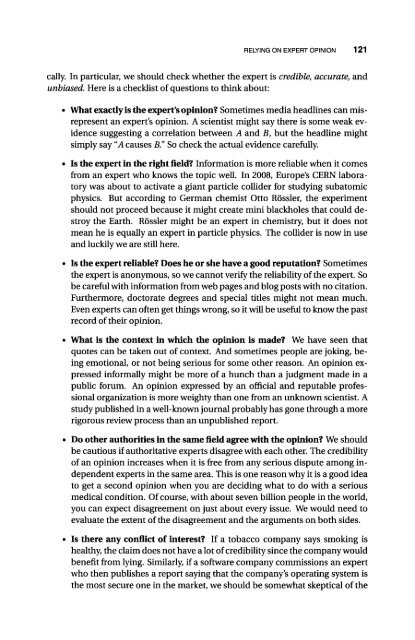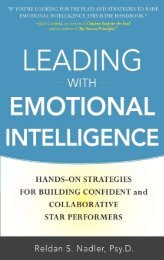An Introduction to Critical Thinking and Creativity - always yours
An Introduction to Critical Thinking and Creativity - always yours
An Introduction to Critical Thinking and Creativity - always yours
Create successful ePaper yourself
Turn your PDF publications into a flip-book with our unique Google optimized e-Paper software.
RELYING ON EXPERT OPINION 121<br />
cally. In particular, we should check whether the expert is credible, accurate, <strong>and</strong><br />
unbiased. Here is a checklist of questions <strong>to</strong> think about:<br />
• What exactly is the expert's opinion? Sometimes media headlines can misrepresent<br />
an expert's opinion. A scientist might say there is some weak evidence<br />
suggesting a correlation between A <strong>and</strong> B, but the headline might<br />
simply say "A causes B." So check the actual evidence carefully.<br />
• Is the expert in the right field? Information is more reliable when it comes<br />
from an expert who knows the <strong>to</strong>pic well. In 2008, Europe's CERN labora<strong>to</strong>ry<br />
was about <strong>to</strong> activate a giant particle collider for studying suba<strong>to</strong>mic<br />
physics. But according <strong>to</strong> German chemist Ot<strong>to</strong> Rössler, the experiment<br />
should not proceed because it might create mini blackholes that could destroy<br />
the Earth. Rössler might be an expert in chemistry, but it does not<br />
mean he is equally an expert in particle physics. The collider is now in use<br />
<strong>and</strong> luckily we are still here.<br />
• Is the expert reliable? Does he or she have a good reputation? Sometimes<br />
the expert is anonymous, so we cannot verify the reliability of the expert. So<br />
be careful with information from web pages <strong>and</strong> blog posts with no citation.<br />
Furthermore, doc<strong>to</strong>rate degrees <strong>and</strong> special titles might not mean much.<br />
Even experts can often get things wrong, so it will be useful <strong>to</strong> know the past<br />
record of their opinion.<br />
• What is the context in which the opinion is made? We have seen that<br />
quotes can be taken out of context. <strong>An</strong>d sometimes people are joking, being<br />
emotional, or not being serious for some other reason. <strong>An</strong> opinion expressed<br />
informally might be more of a hunch than a judgment made in a<br />
public forum. <strong>An</strong> opinion expressed by an official <strong>and</strong> reputable professional<br />
organization is more weighty than one from an unknown scientist. A<br />
study published in a well-known journal probably has gone through a more<br />
rigorous review process than an unpublished report.<br />
• Do other authorities in the same field agree with the opinion? We should<br />
be cautious if authoritative experts disagree with each other. The credibility<br />
of an opinion increases when it is free from any serious dispute among independent<br />
experts in the same area. This is one reason why it is a good idea<br />
<strong>to</strong> get a second opinion when you are deciding what <strong>to</strong> do with a serious<br />
medical condition. Of course, with about seven billion people in the world,<br />
you can expect disagreement on just about every issue. We would need <strong>to</strong><br />
evaluate the extent of the disagreement <strong>and</strong> the arguments on both sides.<br />
• Is there any conflict of interest? If a <strong>to</strong>bacco company says smoking is<br />
healthy, the claim does not have a lot of credibility since the company would<br />
benefit from lying. Similarly, if a software company commissions an expert<br />
who then publishes a report saying that the company's operating system is<br />
the most secure one in the market, we should be somewhat skeptical of the
















